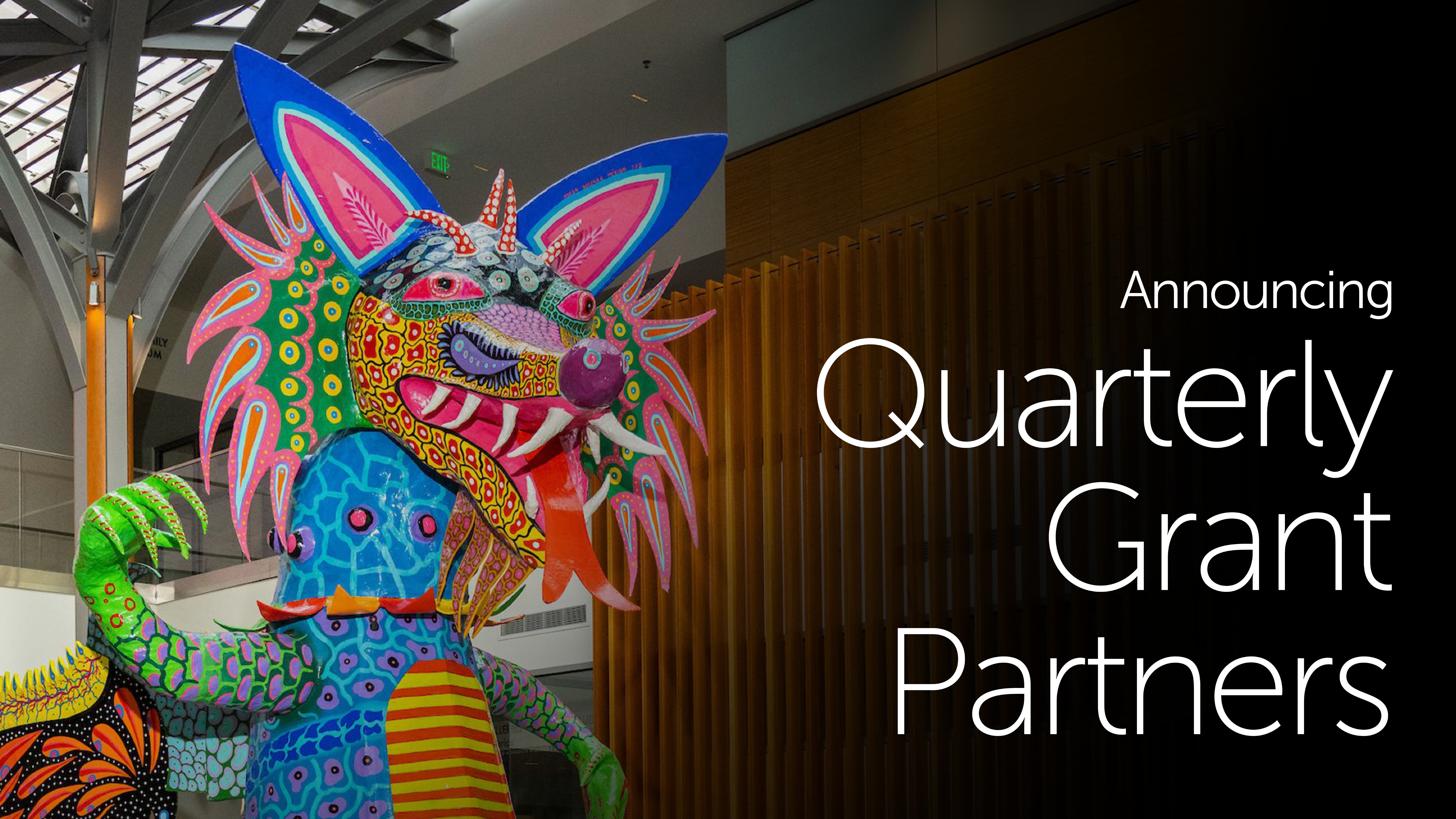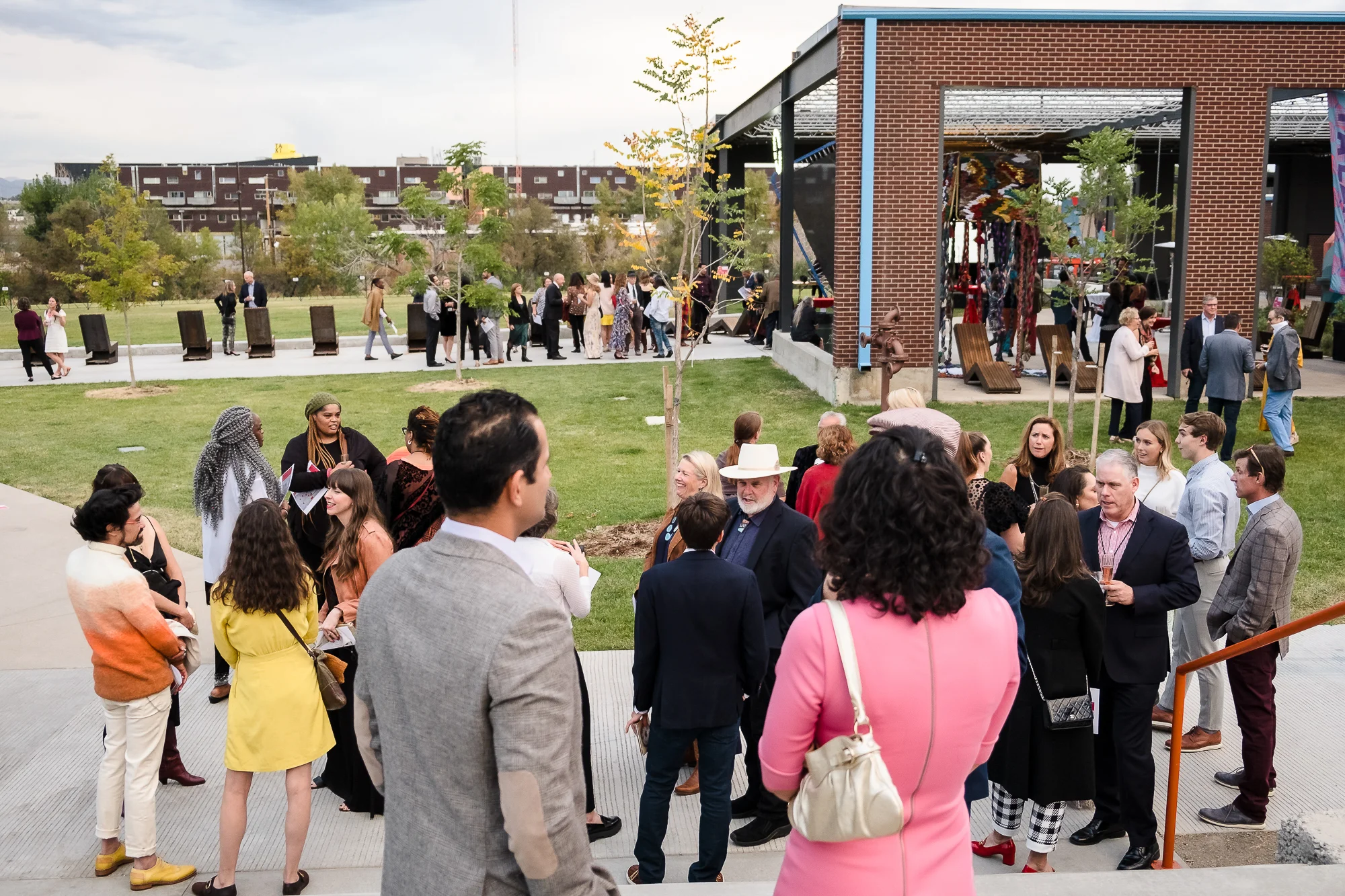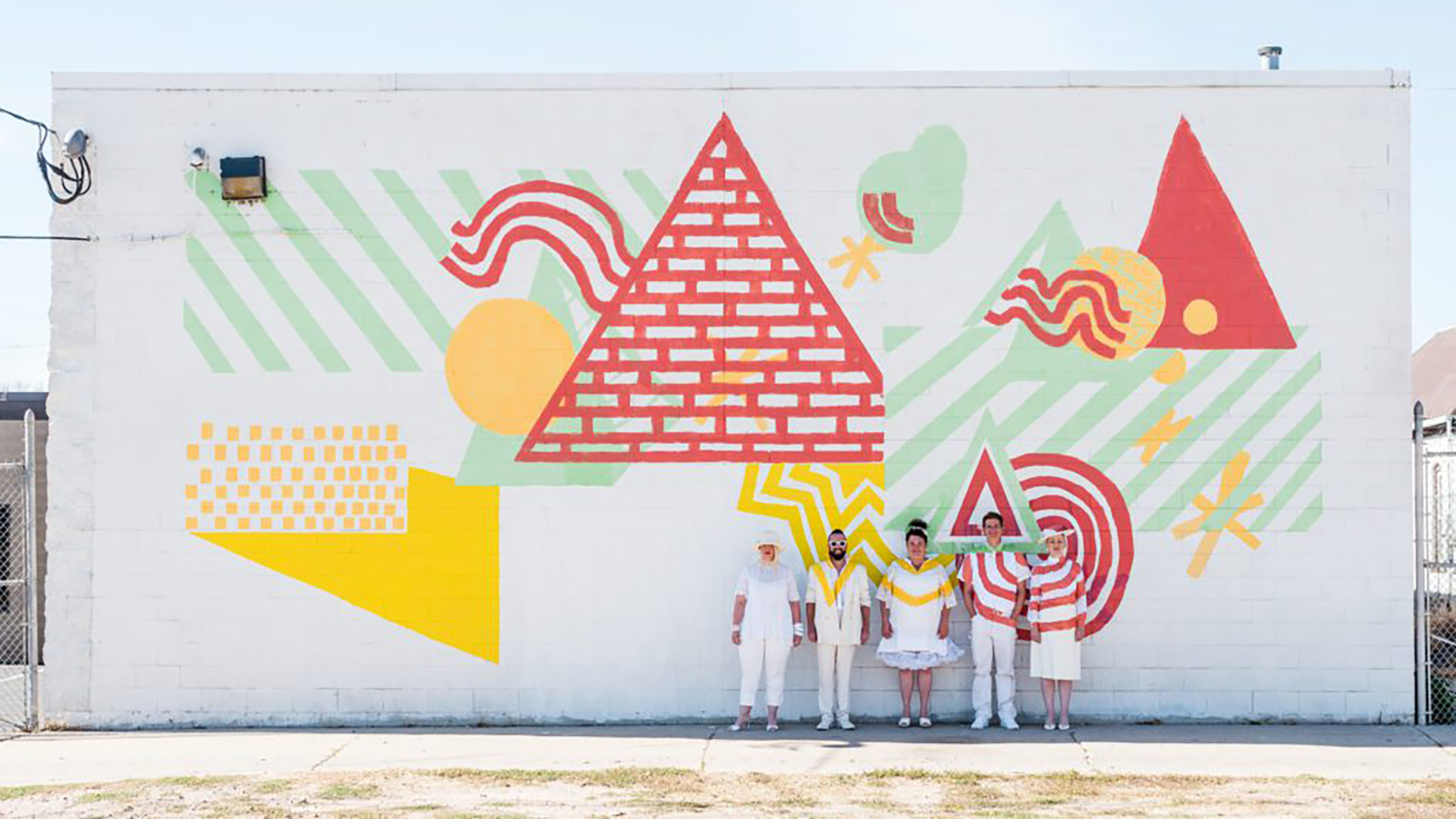Leading With Purpose: How "Radical Inclusion" Shapes Phamaly Theatre Company
May 13, 2025
time
min read time

As the first wave of audition cuts swept across the stage in "A Chorus Line," actor Casey Myers broke into "I Can Do That," a song-and-dance number traditionally defined by an exuberant tap routine. But in Phamaly Theatre Company’s production, the sequence had been reimagined.
Myers, in his wheelchair, created a stunning rhythm by wearing gloves with taps on his hands and hitting them against the chair, causing the sharp sound of metal against metal to fill the Kilstrom Theatre while he sang. It was a moment that didn’t just adapt the choreography — it transformed the meaning of the moment. The song was no longer just about a young boy wanting to dance like his sister; it became a powerful anthem that proclaims that disabled artists can create beautiful art that defies expectations.
For 35 years, the theater company created by people with disabilities had dreamed of staging “A Chorus Line,” a musical about performers fighting for their spot to be in the ensemble. But this wasn’t just about checking a title off the list. Under artistic director Ben Raanan’s leadership, the show became a statement about who gets to take center stage.
“Phamaly productions are an opportunity to look at stories that we know and have somewhat grown a little bit stale in new, fresh ways,” Raanan said as he leaned forward in his chair inside a conference room at Phamaly's shared office space in the Tramway Nonprofit Center in Northeast Denver. “In ‘A Chorus Line,’ not all the dancers were always in perfect unison, but when you get the experience of disability in a play that didn't have it before, it unlocks something new.”
For Raanan and managing director Corinne Melon, “A Chorus Line” was a defining moment for their leadership. Not only was it a financial and critical success, but it exemplified their vision for Phamaly’s future—one where a large, diverse ensemble of 28 artists with visible and invisible disabilities can share the stage in all their complexity.
Raanan, who became artistic director of Phamaly in 2021, has dedicated his career to disability-affirming theater, often drawing on the personal: He has experience with Erb's palsy and a brother with severe autism. Melon, an arts administrator, previously led the Arapahoe Philharmonic and Denver Immersive Opera and brings a steady hand to the company's administrative operations. She joined as managing director in 2023 and was drawn to the organization because of her own strenuous relationship with the arts due to anxiety and depression.
Raanan oversees artistic programming, working closely with actors and creative teams, selecting productions and shaping the overall artistic vision of Phamaly. Melon manages finances, fundraising and community partnerships, ensuring that the company remains financially sustainable while staying true to its mission.
While their leadership styles differ — Raanan is known for his fierce advocacy and boundary-pushing artistic vision that may ruffle feathers, whereas Melon is more measured and always armed with statistics to support her ideas — their common goal is clear: make sure Phamaly not only survives but thrives.
“We have a really great partnership because we have a very similar vision for where we want Phamaly to be,” Melon said. “It’s also really great for us to have two leaders so if you don’t feel comfortable going to Ben, you can go to me and vice versa, which we say to all the staff. This model gives people a lot of ways to give feedback in ways that are comfortable for them.”
But really, “we do everything together,” Raanan said. “When Corinne started, we spent a lot of time focusing on what the overall vision was for the company. Because we both understand who Phamaly is and what we want it to be, it is very rare that one of us will make a decision that isn't aligned with the shared culture we've created.”
A Legacy of Breaking Barriers
In 1989, five alumni of Denver’s Boettcher School—Kevin Ahl, Richard Britton, Kathleen Traylor, Gregg Vigil, and Teri Westerman Wagner—founded the company, originally styled as PHAMALy (Physically Handicapped Amateur Musical Actors League), out of necessity. As actors who used wheelchairs, they faced systemic barriers to participation in mainstream theater. Casting directors overlooked them, stages lacked accommodations, and opportunities were scarce. Rather than wait for the industry to change, they built their own stage.
Over the years, Phamaly’s bold reimaginings of classics such as “Chicago” and “Spring Awakening” have reshaped Denver audiences’ perceptions of disability in theater and, more importantly, given a critical platform to disabled performers. In 2012, the company changed its name to Phamaly Theatre Company, and the nonprofit began to expand outside of Denver, earning national and international acclaim, including its first international production, "The Fantasticks," in Osaka, Japan, in 2015.
Yet, despite its artistic success, Phamaly has faced its share of struggles. In 2017, the organization found itself staring down a $250,000 budget shortfall that threatened its survival. Regan Linton, a former Phamaly performer who had gone on to a national acting career, returned to take on the role of interim artistic director for a year.
"I was one of the first wheelchair users to lead a theater company in America, with the caveat that before there was an official artistic director, all of the founders of Phamaly were wheelchair users," Linton explained. “I didn’t know how bad the financial situation I was coming into in 2016, but I love Phamaly, and I felt like it brought me up. So, I stayed to help get it back on track, which is why I ended up being there five years.”
Linton wasted no time in making the situation clear to the public. “The big thing that I discovered was that because there was no transparency and there had not been communication, nobody knew that Phamaly was in this place,” she said. “I believed that the community would rally behind us if we got it out there and said the company’s not doing well.”
Her instincts were on the money—Phamaly raised $250,000 in just 17 days. Under Linton’s leadership, Phamaly not only stabilized but evolved.
One of her most prominent changes was to the leadership model. “I always pushed for co-leadership because Phamaly had been founded as a theater company, not a social service organization,” she said. “The leadership model made the executive director more prominent, and I pushed for making it a managing director position instead after talking with a number of friends at different theaters in an effort to center the art.”
With Raanan and Melon at the helm, Linton believes that "Phamaly continues to set the tone for what this creative model of disability is and should be in theaters all over the world."
Kelly Hunter, founder of London’s Flute Theatre, an international leader in disability theater, one of Raanan’s mentors and an upcoming collaborator with the company on “Pericles: An Adaptive Show for People with Cognitive Disabilities,” also sees Phamaly’s role as proof that a different future is possible.
“This should be the model that every city has,” she said. “Why doesn’t every theater have a company specifically for disabled actors? In that way, Phamaly is a pioneering, extraordinary company.”
A New Chapter for Phamaly
As Phamaly settles into its next phase of leadership, the composition of its ensemble continues to change. Once primarily made up of actors with physical disabilities, the company has since expanded to include performers with neurodivergence, invisible disabilities and chronic illnesses.
This shifting identity reflects an ongoing conversation within the disability arts movement: should the goal of a company like Phamaly be to integrate disabled performers into the larger theatrical ecosystem or to maintain a distinct space where they can create work on their own terms?
“Ben always says that ‘Phamaly is for anybody who feels the traditional theater process doesn't fit them,’ and exactly how I’d describe who we are for,” Melon said. “We like to say we have radical inclusion at Phamaly. We want to acknowledge people's intersectionality and ensure that whatever identities they have, they feel safe at Phamaly.”
While some of these shifts mark a departure from the Phamaly of the past, Linton remains supportive of Raanan and Melon and continues to offer them advice. “Historically, Phamaly always wrestled with the question of who the company was for,” Linton said. "I tried to think about who can’t work at other companies because there is something explicit about their disability identity that causes other companies to shut down. But Phamaly has always ebbed and flowed.”
Every leadership team is going to have their own approach, Linton believes. “Corinne and Ben’s approach to carrying the company forward looks a little different from the history of Phamaly, but that’s not necessarily a good or bad thing. It’s just different,” she said. “If you're going to move something into the future, you’ve got to think about how to do things differently.”
"Phamaly is for people with any type of disability, but it can be tricky at times," Raanan acknowledges. “When I have performers getting into shows at the Arvada Center and Town Hall Arts Center, it makes me think, ‘Do you still need Phamaly?’ So, I might not cast them in the next show. But these performers keep coming back because those spaces are not as comfortable—they can’t unmask and be their authentic, disabled selves like at Phamaly."
Aiming to be a catalyst locally and nationally
As the company grows, Raanan and Melon are focused on fostering that same trust and openness they have within their internal culture. For them, building a supportive environment behind the scenes is just as critical as what happens on stage.
“Phamaly doesn’t just create an accessible space for the actors—it’s for everyone that works at Phamaly,” Melon said. “We ask all our staff, production teams and contractors, whether you're disabled or not, ‘What are your access needs today?’ That really creates kind of that top-down effect on employees. We’re applying our mission statement to everything we do.”
“There's a lot of emotional weight to what we do at Phamaly,” Melon continued. “For many people, this is their life. We’re both committed to ensuring the long-term prosperity of Phamaly. That means not only putting on world-class productions that push the boundaries of disability theater but ensuring that we’re at the forefront of discussions about accessibility in the arts.”
Raanan and Melon have developed a five-year plan that sets clear goals for both artistic and operational growth. One key objective is to increase compensation for performers and production staff. “We want to become the highest-paying non-equity theater in the Denver Metro because we want to put that value on disabled performers,” Melon said.
The company is also working to expand its repertoire to include more original works by disabled playwrights. On the operational side, Melon is spearheading efforts to diversify the board of directors and form partnerships with theaters, educational institutions and community organizations to extend Phamaly’s reach.
Together, Raanan and Melon see Phamaly as a catalyst for change. Nationally, they advocate for systemic improvements in accessibility and representation. Locally, they’re still defining Phamaly’s evolving role in Denver’s theater scene.
“Last year, I would have had a much stronger answer on Phamaly’s role in the Denver community,” Raanan admits. “I know what our role nationally is, but our role in Denver is tricky. How much am I supposed to push for disability rights in other theaters around town? A lot of the time, those are very messy conversations.”
However, Raanan also acknowledges these conversations can create change. When he approached the Aurora Fox Arts Center's executive and artistic producer, Richard Cowden, with concerns about disability representation in its production of “The Curious Incident of the Dog in the Night-Time,” — a Tony-winning play featuring an autistic lead character — it led to Phamaly unofficially partnering and Raanan joining as the dramaturg.
Embracing “Disabled Joy” in 2025 and Beyond
As both leaders prepared to open their first production of the season, “The 25th Annual Putnam County Spelling Bee,” at Northglenn Arts in March, they knew they were greeting audiences at a politically fraught moment. Disability rights are increasingly being targeted under broader attacks on DEI initiatives, with funding and visibility under threat.
Its 2025 lineup, which also includes an adaptive performance of “Pericles” in collaboration with Flute Theatre in May, “Pippin” in August, and “Dance Nation” in October, is intended to elevate stories that empower both audiences and creatives.
“We aren’t backing down,” Melon said. “Disabled artists deserve to be onstage. Both in our shows and around town. That is why teaching our actors how to advocate for themselves is such an important part of our role. Phamaly helps artists define what they need to succeed so that when they go to another theater, they can clearly communicate those needs.”
“If we lose NEA funding because of our mission, I don't want to have to replace that money, but we can do it if we have to,” Melon said. “My predecessor, Sasha [Hutchings], built up our reserve. We're not in a place where NEA funding is going to make or break us because we have so much community support.”
With a stable $800,000 budget and strong partnerships, Phamaly is in a better position than many theaters. But Raanan acknowledges the larger landscape is shifting.
“Right now, disabled people are being lumped into these attacks on DEI” he said. “Accessibility efforts make it easier to create better art. If actors feel more comfortable on stage, they are able to become vulnerable quicker, which allows you to make better theater.”
“Disabled joy is not something that we see very often,” Raanan said. “If you look at media like ‘Sound of Metal,’ you often get stories about folks who are coming to grips with their disability. Phamaly looks at those very complicated situations but also expresses disabled joy. There's something radical about promoting love within the disabled community in this moment.”
Melon echoes this sentiment, emphasizing that Phamaly’s productions are both a celebration and a statement of defiance against societal limitations.
“We were founded on the rebellious spirit of 'Everyone told us not to do this, so we are going to do it anyway.' We are going to continue to embrace that ethos. As we plan for 2026, some choices will relate to the political moment, but some are just joyful shows meant to lift us out of the dark panic a lot of us are feeling right now,” she said. “Phamaly existing is an act of rebellion.”
Toni Tresca
Toni Tresca is a Colorado-based arts reporter originally from Mineola, Texas, who writes about the evolving world of theater and culture—with a focus on the financial realities of making art, emerging forms, and leadership in the arts. He’s the Managing Editor of Bucket List Community Cafe, a contributor to Boulder Weekly, Denver Westword, and co-host of the OnStage Colorado Podcast and Such a Nightmare: Conversations about Horror. Currently pursuing an MBA and MA in Theatre & Performance Studies at CU Boulder, Toni brings both business insight and artistic depth to his reporting. We are happy to welcome him as our newest resident storyteller.

.png)












.png)











.jpg)
.png)








